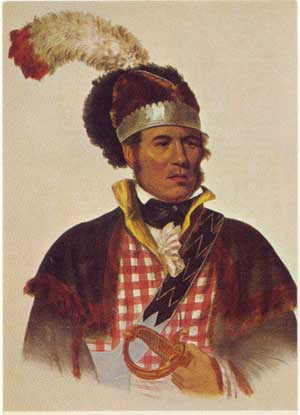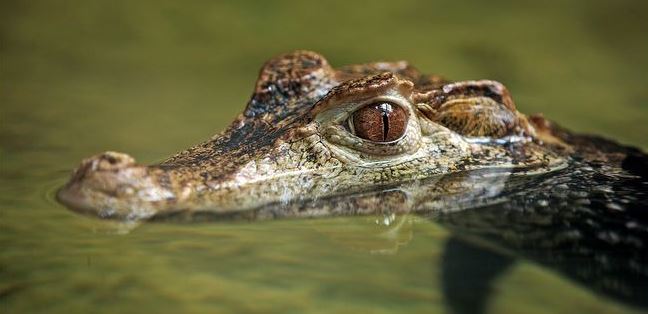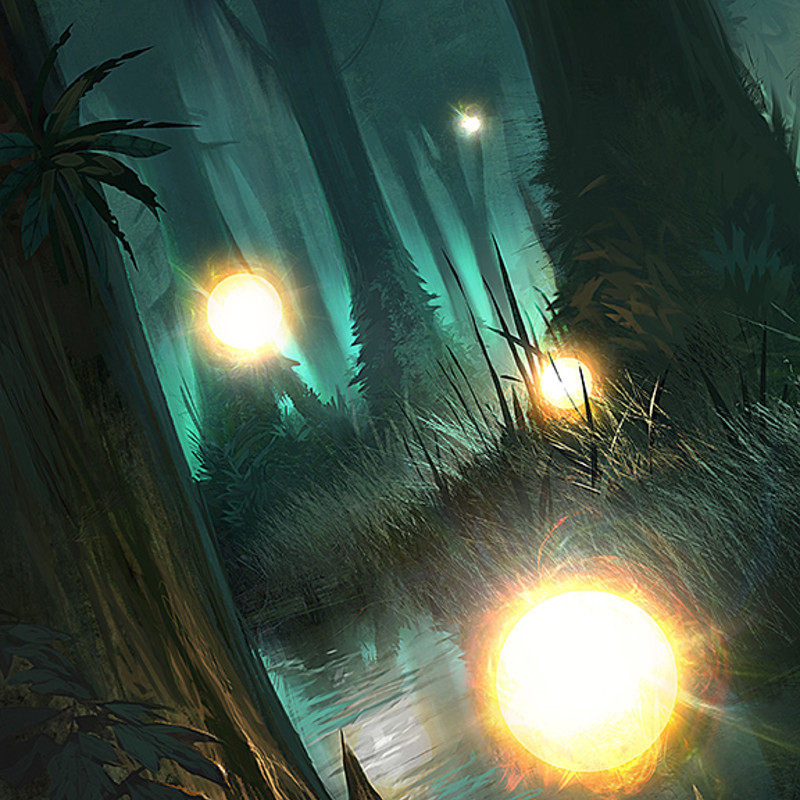August 19, 1720
Once the dragon’s enforced laughter died down and the will-o-wisps had been driven off, Tess went strait to the warrior on whom the wisp had been feeding. While she was unable to find any apparent wounds or other obvious damage, the man was comatose. His breath was shallow, his heartbeat slow, his pulse almost un-findable, and his eyes rolled back in his head — not unlike Dr. Leibowitz when he was strung out on absinthe and laudanum.
Tess glanced around, looking for something sufficiently pungent to serve as smelling salts. Her eyes fell on Rhodri, With a wicked grin she motioned the dirt-faerie over. “Stick your butt in his face…” Sure enough, Rhodri’s stench was a sufficiently sympathetic irritant. The downed warriors awoke with a gasp, his eyes welling with tears and his nostrils flaring and running with mucus. The other Tuscarora warriors, awed by this further display of “faerie magic”, flocked around their companion to tend to him further.
Those of the party that could tried to go back to sleep, hoping to squeeze a few more hours of rest in before daylight. Liadan, meanwhile, addressed the dragon. “What is one of your kind doing here?”
“Delivering the mail,” it said, snaking its long neck down from the tree in which it’s bulk was perched and twisting its head around to look at her upside down. “So…got that drink you owe me?” Liadan promptly filled its cup with the strongest whiskey she could conjure. Plein-Vite said his thanks, then asked, “Say, I have a bunch of letters that I’m supposed to deliver to some trading post up in the mountains. Do you folks know where it is?”
Liadan explained that they were staying there. “Great, maybe you can save me the trip,” the dragon replied, and promptly pulled a rolled sheaf of papers from somewhere behind its left wing and handed it to her. Before she could respond, Plein-Vite had launched itself into the air and was gone.
A quick look at the mail revealed it to be a single letter to Oleg from Constable Zimmerman, describing the events in Germanna two weeks past, along with a series of wanted posters for Liadan, Tess, Zibbler, Amos, Thond, and Sara, accusing them of such crimes as murder, manslaughter, conspiracy, inciting a riot, vandalism, destruction of property, and grand theft (slaves), and a request that they be hung up at the Trading Post and that any information as to the whereabouts of the escaped slaves or the criminals who stole them be forwarded to the Germanna Constabulary. Tess and Liadan both agreed that their likenesses on the wanted posters were not at all flattering.
Once everyone was awake and fed, they resumed the march, turning away from the mountains and the river, and striking out into the wide alluvial plain to the west. The going was easy, over low, gently rolling hills, through light forests cleared of heavy undergrowth by regular flooding.
Just under six hours from when they started out, the Tuscaroran village came into view, though it looked more like a fortified military encampment than an typical village. The village was built on the top of a hill, half-again as tall as any surrounding it, and almost perfectly conical. Tess likened the hill to the volcanoes she’d read about, though without the pyrotechnics. The village was surrounded by a high wooden palisade, even larger than that defending the Trading Post, but nowhere near as well built. There were no corners to speak of, with walls that instead formed a rather wobbly, undulating circle. The posts were not fitted together — some leaned at odd angles, and others still had branches attached, making the whole thing look like some sort of drunken porcupine.
“Well,” Bittercress said in a voice that betrayed a hint of embarrassment, “this is it…”
She marched them up to the gate. It was large, wide enough for a dozen men to pass through abreast, and constructed of the same spike-topped logs as the rest of the wall. Two guards were posted on top of the wall to either side, and, on seeing the large raiding party returning, promptly opened the gate.
Tess watched in amazement at this, for the gate did not swing open, either in or out, like a door, nor raise like a portcullis, nor even lower outward like a drawbridge. Rather, the gate fell inward with a resounding crack, that seemed likely to split some of its constituent logs. When they had all passed through, the guards leaned backwards off the top of the wall, looking likely to fall outside of the makeshift fort, and hauled on thick, heavy hempen cords drag the “gate” back into its upright position, then used the same cords to tie the top corners off to the wall.

“We should offer to help them improve their fortifications too,” she suggested to Liadan.
Inside the compound, they found a large number of conical huts made from hemp fibers daubed with mud, arranged in a circle facing a single, larger building. Seeing that the raiding party was not alone, a crowd quickly gathered to watch the (largely female) band being led in by Bittercress. Other than Bittercress, there was not a single woman to be seen, nor any children. Tess, Liadan, and Siclare quickly counted perhaps two-dozen men, mostly in their early thirties, and another dozen
drowned.

Bittercress lead them to the central building, through a heavy wooden door with interlocking knotted hemp ropes as hinges. If the August heat outside was uncomfortable, the inside of the council house was downright oppressive. The majority of the building was one long room, with a large fire burning in the center. A single door, much like the one they’d entered through, could be seen at the far end, though whether it lead to an inner room or back outside, they could not say. The floor was covered with beautifully woven, but old and worn looking, hemp mats. The only other furnishing was a single wooden chair, clearly of European make, with x-shaped legs and intricately carved arms, which sat across the fire from them as they entered.

Sitting, or rather lounging, in the chair was a tall man, clearly of the same racial stock as Bittercress. On his head was a polished silver coronet, with a single, large white plume coming from the top. He wore a black cravat around his neck, and a tartan-checked shirt covered by a cloak of hemp trimmed with red fox fur. He held a norse-style drinking horn in his left hand, and a Scottish sabre leaned against the chair to his right
.
Bittercress cleared her throat and made a clearly mocking attempt at a European courtly bow. “May I present his highness, King Graceful Cock…”
“It’s
HANCOCK!” the man roared in response.
Liadan stepped forward and bowed, not at all ironically, but most gracefully, with all the pomp and poise she would show a great lord of the fairy courts, and introduced herself as an envoy of the same. This clearly got Chief Hancock’s attention, as he suddenly sat up strait in his chair and peered at the guests across the fire, though it soon became clear that he had no more experience with fairy lore than Bittercress had.
Tess stepped in, with the best curtsy she could manage, and explained that they represented a displaced tribe, much like the Tuscarora were, and were seeking an alliance of mutual protection against the English. The chief seemed slow on the uptake, so Bittercress repeated Tess’s plea, very slowly and loudly, and also explained how they had defeated Mad Bear (though she left out her own part in it).
The chief harrumphed, stood, and staggered towards them. As he stood it became clear that, rather than pants, he was wearing a hempen kilt, and also, Liadan noted, did not live up to his name (at least, not at the moment). It was also clear, from the staggering way in which he approached them around the fire, that he was immensely drunk.
“Wazzat?” he asked.
“We wish to join with your tribe for mutual protection,” Tess reiterated.
“You need protection?”
“Or we could protect you.”
“Ah,” he grinned lasciviously, “bodyguards. I could use some bodyguards. Maybe you could guard my body tonight…”
Liadan, Tess, and Siclare rolled their eyes at the drunken innuendo and continued to make their arguments as to why the Tuscarora should ally with them. Citing their mutual dislike of the Empire, their desire to create a place where all people could live free from Imperial influence and the practice of slavery, and their superior skill at constructing fortifications.
“How many warriors do you have?” the chief slurred.
“Fourty-nine,” Tess said.
The chief paused, long and awkwardly, as if having difficulty doing math in his head. “Their numbers are the same as ours,” Bittercress said helpfully, “together we would have
twice as many warriors,
double what we have now.”
He looked at Liadan, “Why didn’t you send warriors to talk?”
“I think we have different ideas of what a warrior is,” Liadan replied. She then went on to explain that their “tribe” was almost entirely women. Siclare added that just as the remaining Tuscarora warriors faced an inevitable decline into extinction with no women, their “tribe” faced a similar fate if they could not find husbands.
The talk of wives and husbands really got Chief Graceful Cock’s attention. The conversation continued for some time. The chief’s mood soon soured when he realized that his drinking horn was empty, but negotiations were saved by Liadan refilling it with her (magically delicious yet mostly non-alcoholic) faerie wine. After hours of talking, the chief seemed sold. He suggested that they should stay the night, and that they should also talk to the Tuscarora’s shaman.
Liadan graciously accepted the chief’s offer of hospitality, then helped him walk, wobblingly, back to his chair, where he promptly passed out.
Once he was out, they asked Bittercress why there were no women in the tribe. She sat down and explained at length about the Tuscarora war of eight years prior. How she was originally a member of another tribe, the Kǎ’tě’nu’ā’kā’ (People of the Submerged Pine-tree), who had been friendly with the Imperials until disease wiped out almost all of her family. How relations between the Tuscarora and the settlers steadily devolved as the Europeans encroached more and more onto their tribal lands, and how Chief Graceful Cock had lead the first attack executing one of the colonial leaders, and she had joined his cause. How, after years of fighting, their last village was attacked while the Chief and his warriors were engaged in another battle, and three hundred warriors were slaughtered and a hundred women taken prisoner and sold as slaves.
“There were only eighty warriors left when we found Catechna destroyed. Mad Bear and I convinced the chief to break through the Imperial lines and flee, northward. That was eight years ago. A third of our number have been killed, and many others have sought the waters.”
“I guess I should take you to see Shaking Snow next,” Bittercress said, then went on to explain that the shaman was Chief Graceful Cock’s grandfather, and notoriously mean, spiteful, and hateful towards outsiders of any kind. Siclare seemed unbothered by this revelation and asked Bittercress to show them the way. Liadan, however, pointed out that she was clearly the whitest member of their party, and informed them that she would wait behind.
Bittercress lead them outside to an open pit behind the longhouse. A hole, perhaps six-feet in diameter, had been dug in the ground. Numerous beautiful woven hemp mats circled the top of the pit and a single rope hung down into it. Wisps of smoke rolled out the side of the pit opposite the rope. Siclare claimed down immediately, calling into the darkness “Helloooo, I was wondering if we could trade notes…”
The pit lead down into the center of a very large space of roughly the same shape and dimensions as the longhouse above. The floor was a wet, muddy mess, with three to four inches of standing, dirty water. The walls appeared to have been hand-dug from the surrounding clay, with small ridges from where the soil had been scooped away by bare fingers, and were hung at irregular intervals with strips of scaled skin, and, in one place, the full hide of a fifteen-foot-long bull alligator. The only light in the space came from a small, fire burning at one end, choking the low ceiling with smoke that smelled strongly of crisping fat and cannabis.
Tess descended the rope awkwardly and splashed down behind Siclare with a muttered curse. Almost immediately there was a second splashing sound, like the rhythmic lapping of waves, and a pair of bulbous eyes poked up out of the shallow water, following by a snaking tail with a double pair of ridges running along the length.
“Oh, who’s a cute little alligator…” Tess said, leaning forward and picking up the three-foot-long creature. The beast seemed perfectly content to be held and petted by the strange girl.

An unintelligible, but clearly very irritated, voice range out as Tess picked up the animal. Following the sound, Siclare and Tess saw an old, wrinkled, and very angry looking face suddenly protrude from the wall near the fire, followed by pair of shoulders and arms. Siclare tried to translate the man’s speech, and was at least able to get the gist — namely that he was angry with the tiny alligator for spoiling an ambush.
As the man finished emerging from the wall and continued his tirade against the now very docile gator, Siclare tried greeting him in every language she knew. Finally the man gave up trying to get his familiar to attack and responded to Siclare in broken English. The ancient-looking shaman, it seemed, was as much a fatalist as the rest of the Tuscarora, if not more — beaten, broken, and wanting to die. The rest of the tribe, it seemed, only sent people down to him to be killed when their time was ready. He asked Tess and Siclare several times if they had been sent to kill him, and even asked them to do so himself.
Siclare refused this request and went on to explain their desire for an alliance to strike back against the English. Tess explained their plan to wed the women of their “tribe” to his warriors to preserve their bloodlines.
“Oh, you want to marry my grandson? Fine, I consent. Get out!”
“No, not her specifically…” Siclare tried to interject.
“Oh, you both want him?! Fine. Great. Get out!” The old man said, grabbing the little alligator out of Tess’s arms and disappearing back into the muddy wall.
To be continued…







